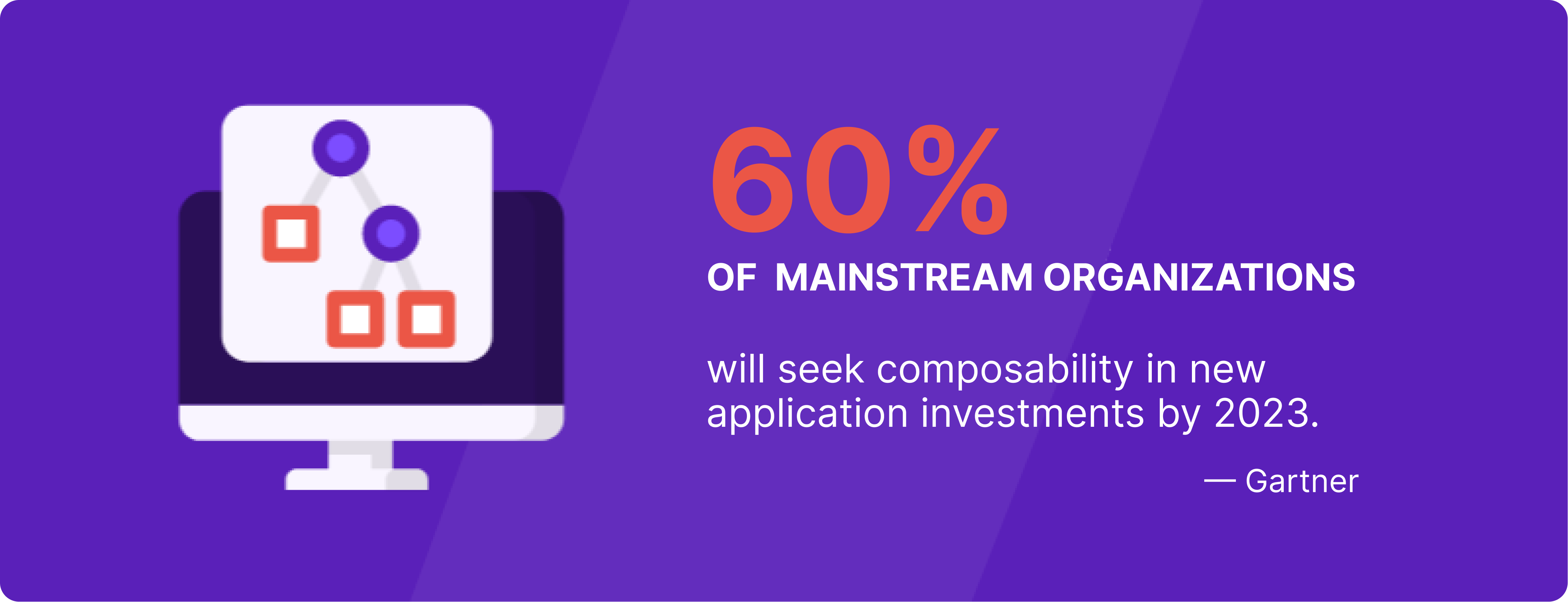Driving personalization at scale with a composable DXP

Share

Unlock personalization at scale with a composable DXP, enhancing user experiences and customer journeys like never before. Transform interactions into meaningful engagements effortlessly. Continue reading to discover how composable DXP can elevate your digital strategy.
Highlights
You’ll learn about personalization at scale with composable DXP
- Composable DXP allows you to deliver personalized experiences to your customers
- Benefits include enhanced user engagement, improved customer journey, and streamlined interactions
Transform your digital strategy with personalization at scale. Opt for a DXP that allows you to deliver tailored experiences.
A recent Google report states that 90% of top marketers identify personalization as essential for profitability, while 61% of consumers expect tailored experiences from brands.
With the adoption of emerging technologies, brands are seeking to establish stronger bonds with customers. A composable DXP offers the tools to personalize every aspect of a customer’s journey. Here is a look at how composable DXPs work and why they are crucial for personalization at scale.
What is a composable DXP?
A composable DXP is a modular SaaS platform that allows you to tailor digital solutions to your unique business needs. In essence, you can integrate tools and services from multiple vendors. It differs from traditional DXPs, where you are locked into a single vendor's solutions. Do you trust that one singular vendor will always be at the forefront of digital solutions?
Using APIs and best-of-breed technology allows you to ‘compose’ a platform that better fits your goals. In this context, you focus on tools that enable you to personalize customer experiences. Its core features include;
- Headless CMS
- Microservices
- API-based integrations
Out-of-the-box, composable DXPs offer solutions that enable you to deliver tailored and custom experiences.
The role of personalization in business growth
When brands personalize customer experience, it leads to higher engagements. It also means that they can acquire more qualified leads and move them through the funnel much faster. You can also enhance customer relationships by delivering personalized content and offers.
For instance, you can collect customer data and use that to inform email campaigns. Doing so enables you to customize email content, which improves open rates and conversions. According to research, 80% of consumers are more likely to purchase a product when a business offers tailored experiences.
Personalization also increases relevance, which reduces churn and keeps users engaged. For instance, SaaS companies can provide customizable dashboards that allow users to personalize the interface to their workflow needs. This keeps them engaged and drives retention.

Key features of composable DXPs for personalization
A composable DXP offers several features that enable you to personalize customer experiences. They include:
- Modular design: Since a composable DXP is modular, you can add or swap out modules. That enables you to adapt your platform to customers' needs, even as those needs continue to change.
- Seamless integration: Composable DXPs easily connect with existing systems via APIs. For instance, a FinTech brand can integrate a DXP with financial analytics and planning tools. So, when a customer interacts via a mobile app, the platform pulls their data from the analytics module to offer loan or investment options based on their recent spending patterns.
- Real-time data processing: Access to real-time customer data allows you to create dynamic personalization strategies. You can adjust content and offers based on user behavior and preferences.
Start your free trial with Contentstack today. Transform your brand's digital presence with Contentstack's open MACH architecture and industry-leading technology. Witness a significant reduction in publishing and development time, and elevate your content management. Start your free trial now.
Case study
GetYourGuide
GetYourGuide provides content for its customers about travel opportunities. With over 500,000 daily visitors, it employs multiple content creators and brand influencers. However, its website's bandwidth was limited, creating a bottleneck within its workflow. As a result, it could not adapt to new travel trends.
They needed a solution to those problems and reached out to Contentstack. GetYourGuide switched to Contentstac’s DXP with a headless CMS. They also used the APIs, connectors, accelerators, and other marketplace services for seamless content delivery.
These enabled them to deliver personalized content to over 500,000 unique website visitors. They also deployed content faster by 90%, and content support and approval times were reduced by 75%.
Hear from Pedro Torres, the product manager. "With Contentstack, we can deliver on -- and exceed -- what customers are expecting, regardless of device, and consistently deliver those experiences as soon as new travel opportunities become available."
Read more about how GetYourGuide used Contentstack to personalize and enrich travel experiences.
How to implement personalization at scale with composable DXPs
There are multiple micro processes required when implementing personalization with a composable DXP, but we can summarize them in three steps, as follows;
- Build and deploy: Outline your business goals. Then, design scalable APIs to leverage an API-first approach. Finally, select a composable DXP solution that aligns with your business goals.
- Select the right modules: Select modules, such as customer data platforms and CRM systems, that allow you to personalize your digital experience solution. Then, tailor and integrate them with your digital experience platform.
- Integrate relevant technologies: Implement APIs and middleware to ensure your personalization tools can interact and share data without any disruptions. Also, they should be integrated with other systems within the DXP.
Using customer data and analytics lets you extract actionable insights that inform your personalization strategies. You can also take things further by integrating AI systems for more precise customer behavior predictions.
The role of a customer data platform (CDP)
A CDP is mainly a tool for marketers. It collects first data from multiple sources. It then unifies it, ensuring you get a single and complete view of each customer. With that data, you can personalize content and offers for your customers.
When should you integrate a CDP?
Integrating a customer data platform into a CDP would be logical when focusing on growth through customer retention. Tailoring customers' experiences can generate repeat engagement and customer loyalty.
Overcoming challenges in scalable personalization
Despite the obvious benefits of composable, you may encounter challenges during installation or usage. Here are common issues and how you can overcome them.
- Data silos: Having isolated data can hurt your ability to deliver unified and cohesive customer experiences. To manage that, create a centralized data strategy consolidating customer information from multiple sources.
- Integration challenges: It is common to encounter integration issues as some personalization tools may not be compatible with your DXP. Use APIs and middleware to ensure seamless integration.
- Inconsistency: Integrating multiple systems can make it hard to maintain consistent brand messaging. To address that, develop guidelines for a cohesive brand voice and synergize your organization’s business units.
Contentstack: Your partner in scaling digital experiences. Twice named a Leader in Forrester's composable DXP award, Contentstack offers an innovative approach to DXP. Experience our 100% microservices architecture and API coverage that allows instant scalability. Start your free trial today.
Future trends in composable DXPs and personalization
The rapid adoption of AI, IoT, and voice assistants will enhance the functionality of composable DXPs. Over the next few years, we can anticipate;
- More businesses will go composable as they recognize the value of modular systems.
- With better access to real-time data, brands will focus on hyper-personalized content and offer. This will improve customer support and allow them to respond faster to customer needs.
- By Q2 2024, cyberattacks on organizations increased by 30% year-over-year, with around 1,636 cases. These incidents ensure that security remains at the core of tech discussions, even as the GDPR continues to implement stringent guidelines. Composable DXP solutions will increase security features to improve data safety.
FAQ section
What is a composable DXP?
A composable DXP is a SaaS platform that allows brands to build digital solutions out of small, modular components.
What is the difference between monolithic DXP and composable DXP?
Monolithic DXPs are all-in-one systems that provide a suite of business solutions, while composable DXPs are modular, allowing you to integrate solutions from multiple vendors.
What is the difference between personalization and hyper-personalization?
Personalization relies on historical data, while hyper-personalization relies on real-time data to tailor user experiences.
Learn more
Composable DXPs empower businesses to tailor customer experiences at every point of their journey. That increases customer retention and ROI. Given it is API-first and modular, you can easily integrate personalization tools.
As you look to drive growth and enhance customer satisfaction, a composable DXP is the way to go. Contentstack offers the leading digital experience platform with personalization solutions. Talk to us today to learn more.



